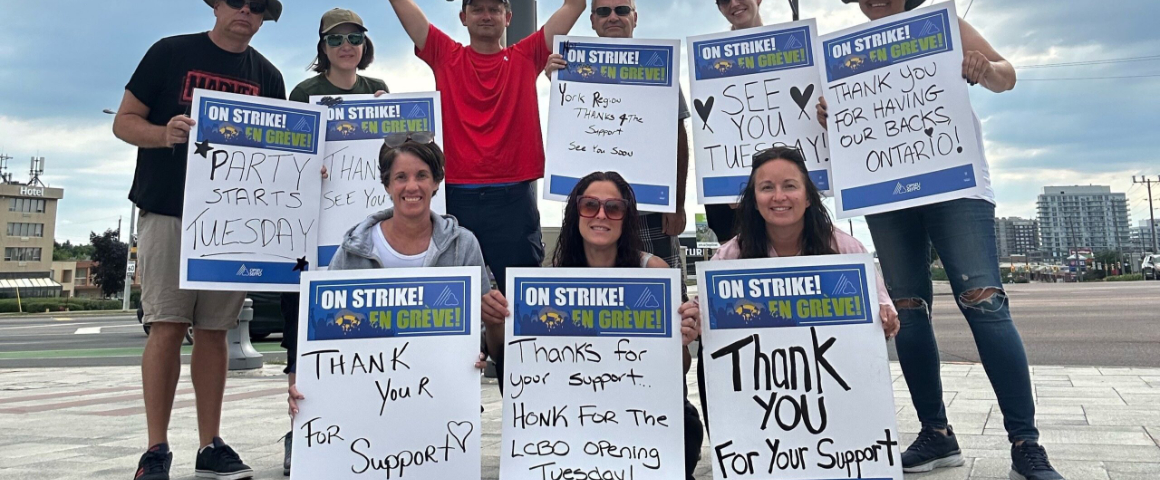By Dave McKee
As we head to press, around 10,000 workers at the Liquor Control Board of Ontario (LCBO) have ratified a new contract and are preparing to return to work after a two-week strike, but the Ontario Public Service Employees Union (OPSEU) says it includes wage, severance and benefit improvements, as well as 1000 new permanent part-time jobs in retail and 60 permanent full-time jobs in logistics.
The deal also provides guarantees of no store closures and a cap on the number of agency stores. These gains are important, as they run counter to the Ontario government’s determined drive to privatize liquor sales. Agency stores are basically private liquor stores that have a licence to operate under the LCBO name.
Privatization of liquor stores is a bit of a bellwether for the overall neoliberal attack on, and working-class defence of the public sector. It doesn’t attract the same kind of public support as, say, hospitals or schools – after all, most people understandably see healthcare and education as far more important public services than booze. At the same time, there’s enormous corporate pressure to privatize alcohol sales because there are huge profits to be made.
But public monopolies on liquor are worth fighting for – both to defend them and to expand them.
In the first place, they provide major revenue streams which help pay for key public services like health, education and others. Losing that revenue stream jeopardizes those services.
It should be no surprise that governments which have championed liquor privatization – Ford in Ontario, Klein in Alberta, Vander Zalm in BC, Moe in Saskatchewan – have had a political commitment to both delivering profitable businesses to their private sector buddies and undermining the funding of other public services as a way to deplete them and pave the way for privatization in those sectors as well.
In the case of Ontario, the Ford government was so eager to fast-track privatization that it agreed to pay at least $225 million (some reports have the figure over $600 million) to break the retailing agreement with the Beer Store (ironically, a private company run by international brewing monopolies).
The sell-off will benefit the retail monopolies like Loblaw and Circle K, an industry the government has consistently supported with a variety of policies at the expense of the public. As OPSEU stated, “when you buy a beer, that should help build a hospital – not pay for a billionaire’s new yacht.”
But what if, beyond just holding the line on privatization, we fought to rebuild and expand public liquor monopolies?
Certainly, the public revenue stream would be even stronger if it included all liquor sales plus a public monopoly on cannabis sales. At a time when people are pressing for expanded public services like childcare, long-term care and pharmacare, increased public revenue is critical.
On top of that, the harmful effects of alcohol and cannabis use can certainly be better mitigated through a publicly owned retailer, whose staff are trained and equipped to deal with situations of substance abuse and addiction.
And then, there is the whole question of how a publicly owned province-wide distribution and retail network could be utilized for broader social good. This is a key piece of public infrastructure which could be expanded into or used as a model for a public food distribution system to improve food security, particularly for Northern and remote communities.
Public monopolies are not perfect, but they can offer important opportunities for building and expanding public services and countering inequality. Realizing those possibilities means building alliances between unions in the public and private sectors and community organizations, and taking up a political fight.
Support working-class media!
If you found this article useful, please consider donating to People’s Voice or purchasing a subscription so that you get every issue of Canada’s leading socialist publication delivered to your door or inbox!
For over 100 years, we have been 100% reader-supported, with no corporate or government funding.




